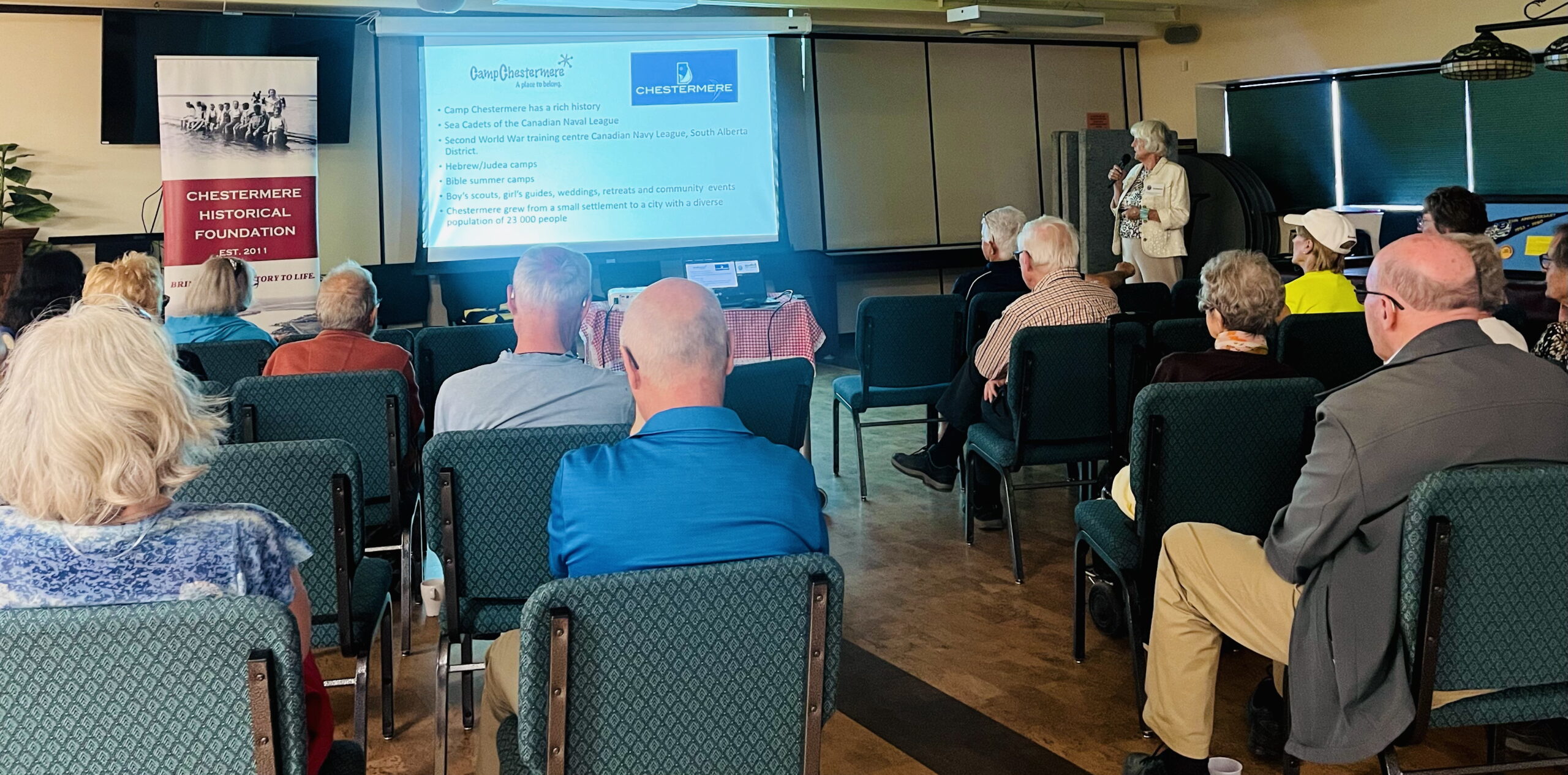On a sunny afternoon, the Whitecappers 50+ Club in Chestermere buzzed with anticipation as locals gathered to learn about the rich history of Camp Chestermere. Doreen Masran, a dedicated member of the Chestermere Historical Foundation, took the stage to deliver an engaging presentation on the evolution of Camp Chestermere, shedding light on its origins, significant milestones, and its impact on the community.
Camp Chestermere, established in 1937, has a storied past that intertwines with the broader history of the Chestermere region. Originally donated by the CPR (Canadian Pacific Railway), the camp’s initial purpose was to serve as a training ground for the Sea Cadets of the Canadian Navy. It was heralded in local papers as “the finest in the Dominion,” emphasizing its significance in preparing young sailors for naval duties. Pictures from the 1930s show Sea Cadets engaged in activities along the lake’s shore, a stark contrast to the camp’s present-day functions.
During World War II, the camp transformed into a training center for the Canadian Navy, hosting soldiers and preparing them for service. The camp’s history during this period is marked by rigorous training exercises and community involvement, with the soldiers becoming a familiar sight in the area.
After the war, the camp transitioned to a summer camp, serving various community groups. In 1947, it was rented by Rabbi Forman, marking the beginning of its use as a Hebrew camp. This camp, known as Judea, was a significant cultural hub for Jewish youth, offering a space to practice Hebrew and engage in traditional summer activities. The Jewish Archives and Historical Society of Edmonton and Northern Alberta provided many of the photographs and documents showcasing this vibrant period.
The Gospel Missionary Association took over in the early 1950s, further diversifying the camp’s usage. The Missionary Association Fellowship of Independent Churches purchased the camp in 1955, cementing its role as a place for spiritual and community gatherings.
Doreen Masran highlighted how the camp’s history is deeply linked with the growth of Chestermere itself. Originally, the land around the lake was leased for recreational use, with cabins popping up along the shores. In 1977, Chestermere was officially recognized as the Summer Village of Chestermere, marking a significant step in its development into a residential area.
By the 1990s, Chestermere had evolved into a bustling community, with the camp at its heart. The Gospel Missionary Association handed over ownership to the Camp Chestermere Association, which has since maintained it as an interdenominational, nonprofit Christian camp.
The origin of the name “Chestermere” remains a subject of local lore. Doreen shared three popular theories:
Chesterfield, Ontario: One theory suggests that early settlers from Chesterfield, Ontario, named the area after their hometown.
Lord Chester: Another theory attributes the name to Lord Chester, a prominent figure connected with the CPR.
Latin and Old English Roots: The third theory posits that the name comes from the Latin word “Chester,” meaning camp, and “mere” from Old English, meaning lake.
While the true origin remains uncertain, these theories reflect the diverse influences that have shaped Chestermere’s identity.
The lake at Chestermere is intricately connected to Calgary’s Bow River through a series of irrigation canals. Established by the Western Irrigation District, this system transformed the lake into a reservoir, facilitating agricultural activities and providing recreational opportunities. The Bow River’s water flows through these canals, maintaining the lake’s levels and supporting the local ecosystem.
Today, Camp Chestermere continues to thrive as a community hub, offering summer camps, retreats, and various community events. It stands as a testament to the enduring legacy of community spirit and collaboration.
Doreen Masran’s presentation not only illuminated the rich history of Camp Chestermere but also underscored its significance as a cultural and historical landmark in the Chestermere community. The camp’s journey from a naval training ground to a beloved community center encapsulates the dynamic and evolving nature of the Chestermere region.
The Evolution of Camp Chestermere: From Sea Cadet Camp to Community Hub

In response to Canada's Online News Act and Meta (Facebook and Instagram) removing access to Canada's local news from their platforms, Anchor Media Inc encourages you to get your news directly from your trusted source by bookmarking this site and downloading the Rogue Radio App. Send your news tips, story ideas, pictures, and videos to info@anchormedia.ca.








